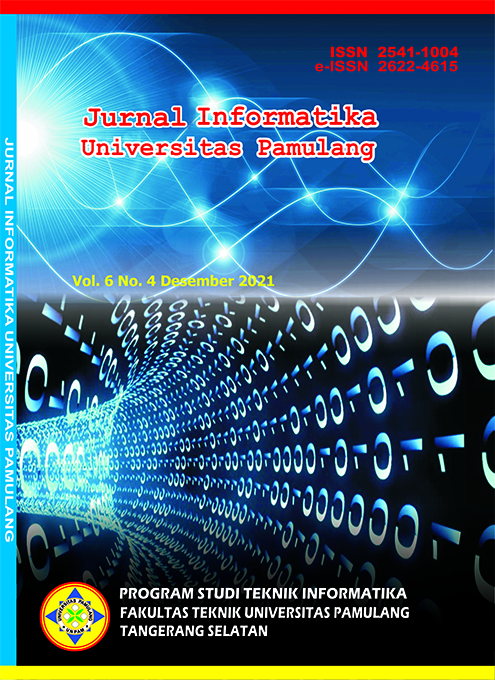Analisis Perbandingan Tingkat Stress Mahasiswa Saintek dan Soshum dalam Pembelajaran Daring pada Masa Pandemi Covid-19 Berbasis Internet of Things
DOI:
https://doi.org/10.32493/informatika.v6i4.14470Keywords:
Student, Stress, Saintek, Soshum, COVID-19, IoT, DASS42Abstract
The spread of COVID-19 has occurred in 2019, which has had an enormous impact on the world's population. The continuous spread of COVID-19 has caused several countries to reduce the transmission of COVID-19, one of which is implementing online learning at schools and universities. The impact that occurs on students due to home study policies makes some students feel anxious and depressed. There are two study groups at the University of Lambung Mangkurat, namely the Social Humanities (Soshum) and Science and Technology (Saintek). The student who majored in science, technology, and social science has a different way of finding the information needed and understanding every material available online. This problem is due to cultural differences in the applied learning system. These differences certainly cause different stress levels for each student majoring in science, technology, and social sciences. Therefore, this study was conducted to determine the difference in stress levels experienced by Lambung Mangkurat University students in science, technology, and social media while online. This study uses two stages to compare the results of student stress levels, including filling out the DASS42 questionnaire and direct testing with 3 IoT sensors, namely GSR, body temperature (GY-906 MLX90614 Infrared Temperature Sensor), and pulse rate (MAX30102 Pulse Oximeter & Heart-Rate Sensor). The application of the Fuzzy Logic method is used as a parameter measurement when measuring IoT-based stress levels.
References
Agustine, N. S. S. (2018) ‘Desain Monitoring Ketegangan Mental Seseorang (STRES) berbasis Fuzzy Logic dengan menggunakan Sistem Operasi Android’.
Andhini, N. F. (2017) ‘Metode Survey’, Journal of Chemical Information and Modeling, 53(9), pp. 1689–1699.
Aryansah, J. E. and Sari, S. P. (2021) ‘Analisis Peran Regulasi Emosi Mahasiswa terhadap Kebijakan School From Home Di Masa Pandemi Covid 19’, 6(1), pp. 8–14.
Barseli, M., Ifdil, I. and Fitria, L. (2020) ‘Stress akademik akibat Covid-19’, 5(2), pp. 95–99.
Jenis-Jenis Penelitian (2021). Available at: https://www.tokopedia.com/blog/jenis-penelitian-edu/ (Accessed: 18 July 2021).
Kusumadewi, S. and Wahyuningsih, H. (2020) ‘Model Sistem Pendukung Keputusan Kelompok untuk Penilaian Gangguan Depresii, Kecemasan dan Stress Berdasarkan DASS-42’, Jurnal Teknologi Informasi dan Ilmu Komputer, 7(2), p. 219. doi: 10.25126/jtiik.2020721052.
‘Perbedaan Tendensi Mencari Bantuan Akademik Yang Adaptif Berdasarkan Jenis Bidang Ilmu Di Universitas Diponegoro Semarang’ (2014) Empati: Jurnal Karya Ilmiah S1 Undip, 3(2), pp. 190–199.
Satgas Penanganan COVID-19 2021 (2021). Available at: https://covid19.go.id/ (Accessed: 7 July 2021).
Downloads
Published
Issue
Section
License
Authors who publish with this journal agree to the following terms:
- Authors retain copyright and grant the journal right of first publication with the work simultaneously licensed under a Creative Commons Attribution-NonCommercial 4.0 International (CC BY-NC 4.0) that allows others to share the work with an acknowledgement of the work's authorship and initial publication in this journal.
- Authors are able to enter into separate, additional contractual arrangements for the non-exclusive distribution of the journal's published version of the work (e.g., post it to an institutional repository or publish it in a book), with an acknowledgement of its initial publication in this journal.
- Authors are permitted and encouraged to post their work online (e.g., in institutional repositories or on their website) prior to and during the submission process, as it can lead to productive exchanges, as well as earlier and greater citation of published work (See The Effect of Open Access).
Jurnal Informatika Universitas Pamulang have CC-BY-NC or an equivalent license as the optimal license for the publication, distribution, use, and reuse of scholarly work.
In developing strategy and setting priorities, Jurnal Informatika Universitas Pamulang recognize that free access is better than priced access, libre access is better than free access, and libre under CC-BY-NC or the equivalent is better than libre under more restrictive open licenses. We should achieve what we can when we can. We should not delay achieving free in order to achieve libre, and we should not stop with free when we can achieve libre.
Jurnal Informatika Universitas Pamulang is licensed under a Creative Commons Attribution-NonCommercial 4.0 International (CC BY-NC 4.0)
YOU ARE FREE TO:
- Share : copy and redistribute the material in any medium or format
- Adapt : remix, transform, and build upon the material for any purpose, even commercially.
- The licensor cannot revoke these freedoms as long as you follow the license terms





